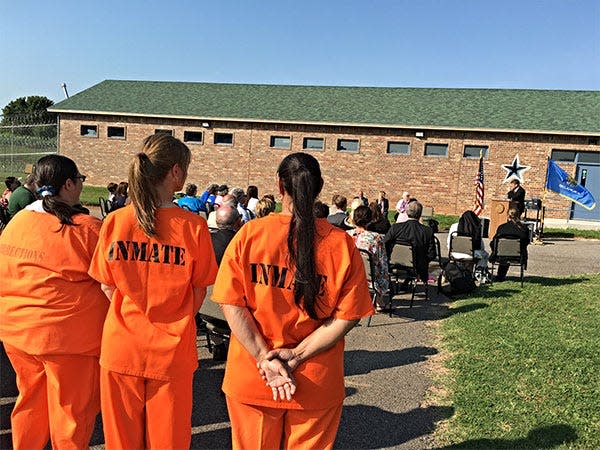Bill giving domestic abuse survivors sentencing relief advances in Oklahoma Senate

If someone commits a crime, one basic goal of investigators and the court is to find out why — and learn what factors controlled the situation.
As of this week, Oklahoma is on a path to consider whether a person's exposure to domestic abuse could be a mitigating factor that affects how the state punishes them for committing that crime.
Senate Bill 1470, which advanced unanimously in the Oklahoma Senate on Thursday, doesn't directly influence whether someone can be charged or prosecuted. Instead, details of a domestic abuse survivor's personal history can be used to reduce their sentence.
"We are stating a policy in Oklahoma that domestic violence, physical abuse and sexual violence is unacceptable. Our levels are disparagingly high, and we must address that," said the bill's author and Senate Pro Tempore Greg Treat, R-Oklahoma City.
A similar bill passed through the House of Representatives last year but stalled late in session.
'Oklahoma is in the midst of a domestic violence crisis'
According to the National Coalition Against Domestic Violence, about half of Oklahoma women experience domestic violence in their lifetime. The same study found that 41% of men are also survivors of abuse that can include physical violence, rape or stalking by an intimate partner.
“Oklahoma is in the midst of a domestic violence crisis, ranking first in the country in the perpetration of domestic violence and third in domestic homicides. At the same time, Oklahoma’s legal system is structured to punish survivors who defend themselves,” said Tara Tyler, executive director of Ponca City’s Survivor Resource Network. “The Oklahoma Survivors Act is a beacon of hope for domestic abuse survivors across the state."
There are multiple cases of women in Oklahoma charged with murder, but who claim they killed an abuser because they feared for their life. April Wilkens is one of those women, currently serving a life sentence for first-degree murder.
More: Oklahoma remains among highest in nation in domestic violence homicides, report says
In an op-ed written for The Oklahoman last year, Wilkens said she shot her ex-fiancé after he handcuffed her, raped her and threatened to kill her.
"As he lunged toward me, I shot him with one of his own guns and could not stop firing until the gun was empty. He was shot eight times. Later that day, a sexual assault nurse documented my numerous injuries, including bruises all over my body and vaginal tears," Wilkens wrote.
The prosecution claimed her injuries happened during consensual sex. Since starting her life sentence 24 years ago, she's been denied parole four times and two commutation requests were refused.
The proposed law doesn't apply to sentencing for sex crimes, elder neglect or child abuse. It also can't be used by those who have received the death penalty.
Bill also could affect those currently in prison
Along with guiding courts on how to sentence people in newly prosecuted crimes, those who are already in prison will be able to petition the court to examine their sentence in this new light, people like Wilkens.
"It is incredibly important that we embrace trauma-informed sentencing," said state Sen. Carri Hicks, D-Oklahoma City. "I think it is incredibly important that we continue to recognize that Oklahoma has the highest rate of domestic violence and domestic abuse, and that individuals who could currently be serving terms have been impacted by their abusers — and yet our criminal justice system is not giving them adequate support to overcome their traumatic pasts. I think that this is an incredible step forward."
While trauma-informed sentencing has been discussed in justice reform circles for a long time, legislatures have been slow to enact these kinds of reforms. If Oklahoma's bill becomes law, it would be only the second state in the nation behind New York, which enacted its own domestic violence survivor's law in 2019.
"I think the universal support around this from everyone really shows that we can do reforms that make sense and that truly benefits the public and the interest of justice," said Alexandra Bailey, senior campaign strategist for the The Sentencing Project, a national advocacy organization. "This should be a very proud moment for Oklahoma."
This article originally appeared on Oklahoman: Sentencing reform for domestic violence survivors advances in Senate
